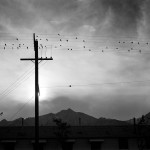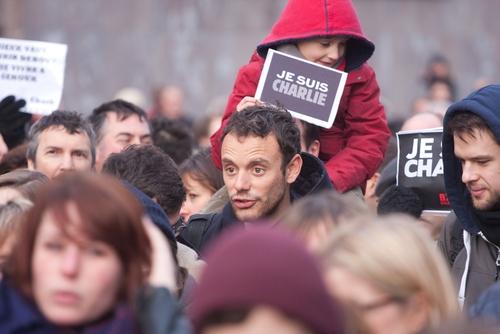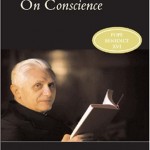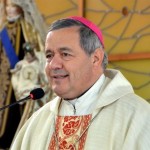In looking again at the text of Pope Benedict’s White House address, I was struck by how serious were his remarks within the context of such a short speech given amid such pomp, particularly here:
Historically, not only Catholics, but all believers have found [in America] the freedom to worship God in accordance with the dictates of their conscience, while at the same time being accepted as part of a commonwealth in which each individual and group can make its voice heard. As the nation faces the increasingly complex political and ethical issues of our time, I am confident that the American people will find in their religious beliefs a precious source of insight and an inspiration to pursue reasoned, responsible and respectful dialogue in the effort to build a more humane and free society.
This is a very interesting paragraph in light of the fact that Europe is slowly losing its ability to dialogue about faith (or about much of anything) in the face of its own laws — which suppress free speech in the name of “tolerance” — and its intimidated response to an aggressive strain of Islamic fundamentalism that continually preaches blood over brotherhood. Europe, which twice in the 20th century needed rescuing from totalitarian jackboots, is rather quickly becoming subjugated again; it is a place where Bridget Bardot can be legally prosecuted for daring to express her own thoughts and filmmakers, writers and artists must quell their own voices or submit to a life in hiding, where Shari’a law is making inroads because western law – and lawmakers – are standing aside for it and hoping to stay out of the crosshairs.
Like his predecessor John Paul II, who lived as a slave under the Nazi’s and then had to preach and teach in the sight of the restrictive communists, Benedict knows what it is to live under tyranny. As a 14 year old seminarian he was forcibly conscripted into the Hitler Youth, from which he deserted, hiding until he was found by Americans and taken as a prisoner of war. Benedict is likely the last 20th Century man standing in a position of world power, and his voice is one of experience and personal knowledge. He has been a witness to the power of hope and faithfulness over tyrants and terrorists, and he is telling us something very important, very serious:
The preservation of freedom calls for the cultivation of virtue, self-discipline, sacrifice for the common good and a sense of responsibility towards the less fortunate. It also demands the courage to engage in civic life and to bring one’s deepest beliefs and values to reasoned public debate. In a word, freedom is ever new. It is a challenge held out to each generation, and it must constantly be won over for the cause of good (cf. Spe Salvi, 24).
[…]
[The Church] is convinced that faith sheds new light on all things, and that the Gospel reveals the noble vocation and sublime destiny of every man and woman (cf. Gaudium et Spes, 10). Faith also gives us the strength to respond to our high calling, and the hope that inspires us to work for an ever more just and fraternal society.
Reading that reminded me of Al Qaeda calling for America to convert to Islam and their forced conversions of two kidnapped Western journalists, Steve Centanni and Olaf Wiig. After their “conversion” there was some spirited and useful debate about whether one should convert to save one’s life.
Benedict’s words seem to suggest that we ought not allow things to get to that point. He has, himself, offered to meet with Muslims for dialogue; moderates will meet, some others have said they will not. I believe Benedict – whose mein and manner the writer “Spengler” has characterized as “I have a mustard seed, and I’m not afraid to use it”, is praying for peace, and religious and political co-existence, but he knows it may be a long hard slog, though different than the one Bush has initiated.
At the release of those kidnapped journalists I wrote:
But whether Centanni and Wiig were men of faith, or not, their “conversions” were a sort of victory for our enemies. They displayed to the world what the West “holds dear.” I am not saying the newsmen were cowards [but]…their pronouncements about Allah and Mohammed, and their confession of new, Islamic names, was a real-time demonstration to the Islamofascists in our midst that “staying alive,” means the world to us. It can be translated as “look at these callow Western dogs, so in love with life, so beholden to nothing that they will say anything, do anything, even allow us to rename them, to cling to life…while we will give up everything…”
[…]
…To allow someone else to name you is to count yourself the lesser…By proclaiming their new Islamic names Centanni and Wiig – probably quite unwittingly – were declaring themselves new men in Allah. They were also living metaphors for the surrender of “the lesser” West.I wonder, in war, can any innocent captive live or die only to themselves? I don’t think so, not when our enemy is so fluent in the language of symbolism and imagery.
[…]
Am I urging the West toward martyrdom, here? No, I am not urging it. But I am suggesting throughout history, martyrs have spilled blood and it has made a difference. I am suggesting that down the line some may well be called to martyrdom, and we might be wise to anticipate it and understand its use. I am suggesting that when one is caught in a fight between darkness and light – a fight that is more super than natural – such blood might well be required. It always has been, before.
Pope Benedict can see what surrender to a murderous and extreme movement will lead because he has seen it before; while the face of the oppressor may be new, the oppressor himself is an old, old foe. In a very socially unserious age, let us hope that the seriousness of this very quiet-but-serious man pierces our fogs and fantasies.
Sr. Lorraine sees Benedict’s constancy.











